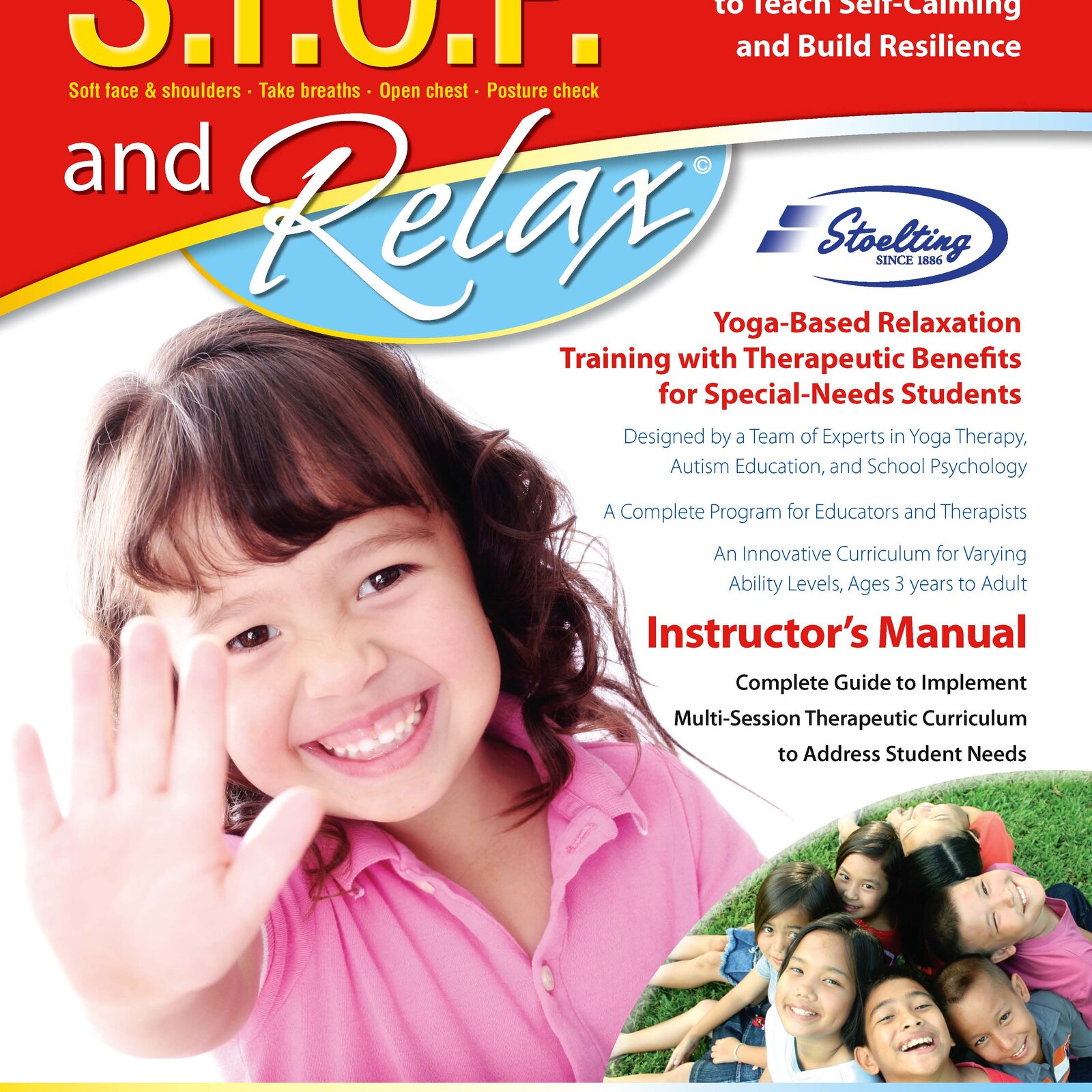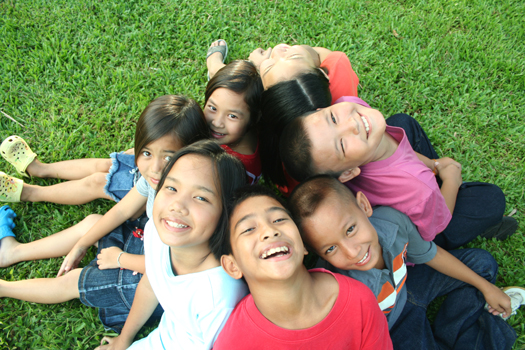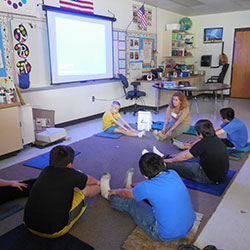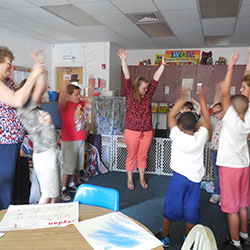Please specify the quantity of product(s).



STOP and Relax Therapeutic Yoga-Based Curriculum
| Item | Product | Price | QTY |
|---|---|---|---|
| 31352 | STOP and Relax Yoga-Based Therapy Curriculum Kit | $215.00 | |
| 31352C | STOP and Relax Cue Cards | $140.00 | |
| 31352M | STOP and Relax Manual | $85.00 |
S.T.O.P. and Relax® - A Yoga-Based Relaxation Curriculum to Build Resiliency Skills
Louise J. Goldberg, M.A., ERYT500, C-IAYT, LMT, Sally Miller, M.Ed., Debra A. Krodman Collins, Ph.D., NCSP, FLPY, and Daniela Morales, M.Ed.
- Use: To support teaching self-regulation skills with yoga-based techniques
- Age Range: 3 years to Adult
- Time: 25 Lesson Plans ranging 5 - 30 minutes in length, can be taught over several weeks
- Includes: Manual and Cue Cards
Implement a Complete Relaxation Program
“Calm down! There’s nothing to get upset about.” If only it were that easy! More than a “yoga break” for classrooms, S.T.O.P. and Relax systematically develops self-regulation skills, reducing reactions of anxiety and frustration and replacing them with calm, reflective responses. Regular practice supports functional use of the innovative “S.T.O.P.” self-calming procedure, increasing and generalizing skills for coping with academic, social, and emotional stresses. Our curriculum offers digital and/or printed versions of the instructor’s manual, visual cue cards, lesson plans, posters, props, progress-monitoring tools, and more, along with audio tracks of music and guided imagery.
- S.T.O.P. and Relax Kit (31352) is a complete yoga curriculum with clear instructions, sample lessons, and presentation materials.
- Includes reproducible and adaptable material for creating lessons suitable to the particular student(s) and setting.
- Evidence-supported reduction of physiological indicators of stress
- Customizable to address specific individual, group, or program issues
- Can be taught in general education and special education classrooms, small groups, individual therapy in clinic setttings
- Can be used in treatment programs - therapeutic camps, small programs
- Can be integrated to support home use
The Curriculum Includes:
- Easy-to-follow Instructor’s Manual
- 55 Instructor’s Cards to guide presentation of each posture
- 55 Visual Cue Card Slides to show students each posture
- Focus Circles and Footprints to show students where to look or stand
- 25 structured, adaptable Lesson Plans, ranging from 5 to 30 minutes
- 25 Lesson Sequences as PowerPoint slide shows
- Student Story Books to introduce the program and to generalize skills
- Progress Monitoring Tools
- Permission Slip templates for school use
- 2 Posters: Rules for Relaxation, and the 4-step S.T.O.P. self-calming sequence
- Audio: Guided Breathing, “Floating on a Cloud” full-body relaxation, and selected tracks from Music for Dreaming © by Rich Foss
STOP and Relax Cue Card Example:
Developed by experts for ease of use
A yoga therapist, psychologist, and two special education teachers designed S.T.O.P. and Relax to equip teachers, therapists, and parents with step-by-step instructions and visual and auditory supports. Testimonials confirm that the curriculum is well-organized, enjoyable, and user-friendly.
Highly Adaptable
S.T.O.P. and Relax is in use in general and special education classrooms, clinics, agencies, and homes, with individuals aged three years to adult – across the United States, and in countries such as England, Australia, and Canada. Providing advice for the selection of yoga postures and instructional approaches, supported by visual cues, the curriculum makes practice accessible to individuals challenged by verbal communication, abstract concepts, attention deficits, and/or physical limitations. Instructors choose postures and adapt lesson lengths to fit varied settings and schedules.
Evidence-Based
S.T.O.P. and Relax integrates methods supported by research, including the National Autism Center’s 2009 National Standards Report. These include yoga, progressive relaxation, modeling, visual prompts, and story-based intervention.
The complete S.T.O.P. and Relax Curriculum Kit (31352) contains STOP and Relax Cue Cards (31352C) and the Manual (31352M).
The Cue Cards and Manual are listed individually for customers who wish to order additional or replacement copies.
Implementing S.T.O.P. and Relax in the Classroom Setting
 S.T.O.P. and Relax©, a visual curriculum for teaching yoga-based exercises and relaxation techniques to individuals with ASD, makes the experience of relaxation available to those who may never have known how it feels to be peaceful. Developed by autism educators, a school psychologist and a yoga teacher, S.T.O.P. and Relax© introduces this calming experience without complex language or complex reasoning.
S.T.O.P. and Relax©, a visual curriculum for teaching yoga-based exercises and relaxation techniques to individuals with ASD, makes the experience of relaxation available to those who may never have known how it feels to be peaceful. Developed by autism educators, a school psychologist and a yoga teacher, S.T.O.P. and Relax© introduces this calming experience without complex language or complex reasoning.
S.T.O.P. and Relax© begins with the recognition that stress itself interferes with thinking and promotes inflexible, automatic reactions. Relaxation is fundamental to self-regulation, flexibility, and adaptive decision-making. This is inherent in the functioning of the autonomic nervous system as it shifts between the “fight/flight” state and a state of calm.
The skills learned through S.T.O.P. and Relax© support children’s success at school and in the community. S.T.O.P. and Relax©promotes skills relevant to mastering IEP goals pertaining to self-control. Mastery of relaxation and self-calming skills makes a child less vulnerable to sensory stimuli and less reactive to unexpected or unfamiliar events. Children learn to avert stress episodes and maintain composure.
Children and teens with autism spectrum disorders (ASD) are highly vulnerable to escalating stress and anxiety. The triggers vary from everyday sensory input (the sound of a vacuum cleaner) to situational events (outdoor recess canceled). The child’s anxiety and agitation may result in challenging behaviors, ranging from complaints, protests, and withdrawal to tantrums, aggression, and “meltdowns.” Often it is difficult to soothe the child, especially after he or she begins to spiral out of control, recovering composure only after becoming physically exhausted.
Stress episodes interrupt a child’s learning and social engagement. Sometimes, for some c hildren, the behaviors associated with these episodes present a danger to self or others.
hildren, the behaviors associated with these episodes present a danger to self or others.
S.T.O.P. and Relax© differs from other interventions that aim to help children with ASD manage stress by organizing the practice of relaxation and self-calming into accessible cues and lessons. Developed in 2001 and updated in 2010, S.T.O.P. and Relax©builds upon the work of Dr. Herbert Benson (author of The Relaxation Response), June Groden (The Groden Network), Carol Gray (Social StoriesTM), and the TEACCH center’s use of structured teaching approaches and visual cues. The 2009 National Standards Report (National Autism Center) supports the effectiveness of methods integrated within S.T.O.P. and Relax©: progressive relaxation, modeling, visual prompts, and story-based intervention. The importance of yoga as a component of S.T.O.P. and Relax© is supported by Dr. Benson’s work; also, yoga lends itself to modeling, visual cues, and structured practice.
Skills are broken down into simple steps that gradually increase in difficulty, according to the level of the child. Cues integrated throughout the program enhance the child’s responsiveness. Ultimately, the child is able to create a relaxed response by using the ‘S.T.O.P.’ procedure.
S.T.O.P. and Relax© is relevant for school systems seeking evidence-based interventions that maximize academic achievement. Teachers have reported that after a S.T.O.P. and Relax© session, children are better able to focus and complete assignments. The skills acquired through S.T.O.P. and Relax© support students’ participation in the instructional setting, so that they remain on-task and engaged in learning. Moreover, many children and teens with ASD are required to take high-stakes tests that determine their futures. The calming skills learned through S.T.O.P. and Relax© reduce students’ test anxiety and increase their cooperation, focus and stamina for test-taking. For this reason, the pilot project for S.T.O.P. and Relax© was initiated in an elementary school in Broward County, Florida, during the first academic year that children in self-contained classes for ASD were required to take the state achievement test.
Children who regularly practice S.T.O.P. and Relax© generalize their skills. Parents have observed their children implement S.T.O.P. and Relax© exercises during situations such as waiting for a late school bus, or self-calming before sleep. A child with ASD went to the dentist for impressions of her teeth. After two unsuccessful attempts, she independently went through the four-step ‘S.T.O.P.’ sequence and was able to remain calm throughout the procedure. Teachers report children adjusting their breathing or posture independently during stressful situations in class. The children’s spontaneous actions demonstrate that S.T.O.P. and Relax© supports their capacity to self-monitor, implement relaxation techniques, avert stress episodes, and make productive, constructive choices.
Interested in using S.T.O.P. and Relax© in your setting for research purposes? Let us know — we’d love to connect and support your research!
“Our Vision is for every child to enjoy the gift of relaxation and have self-control skills to manage stress.”
Practitioners:
“Want to let you know that I received your materials — S.T.O.P. and Relax. It really helped to see the two classes and of course to see you. I like the whole set up of the materials—especially the dots and feet! Of course, everything is clear, well thought out and easy to use.I love the “rock the baby”. I am a registered movement therapist and do Yoga for Special Children. I work at the Maryland School for the Deaf in Columbia Maryland. I’ve been there for about 7 years, teaching deaf children with moderate to severe disabilities. I see each child one on one for thirty minutes twice a week. Their syndromes run the gamut, and some of my kids are multiply handicapped.” ~ Connie B.
“My students and I have been enjoying our S.T.O.P. and Relax course. I just finished an individual program with a boy and an 8-week class with 5 boys, 3 have Asperger’s and 2 are brothers of one of the boys (triplets). The kids frequently came in, sat down and said, “I love this class!” I am about to start another class because of interest generated by the parents talking to their friends.” ~ J. L., tutor of children with autism spectrum disorders
“I finally started using your S.T.O.P. curriculum yesterday. It is great! I started with one student to get a feel for it. The student is a 5-yr. old boy with Asperger’s that I have been working with privately in his home for about 2 years. The session started right after arriving home from school without a play break. Yet he immediately was fully attentive and participated wonderfully to the 30-minute session, which isn’t always the case when he doesn’t get a breather before we start working together. I used my computer to play the CD for the breathing and cloud exercise. The curriculum is so well laid out and the ease of preparation and first session was so impressive yesterday, that I feel comfortable with forging ahead on my plan for a small group of students and their parent. Thank you for developing a wonderful product.” ~ Judy L.
“Thank You! I am making plans now to implement this program in my adapted physical education classes.” ~ Physical Education Teacher, Hollywood, Florida
“Our school psychologist referred me to you about your program. She says it is the best instrument around! She said it is the most effective program she has used and would recommend it to everyone in the counseling field.” ~ School counselor in Brooksville, Florida
“Can’t even begin to tell you how happy I was to meet you today. I loved the presentation and my daughter and I just finished doing a few of them. She got right into it and it was clear that she was familiar with breathing from yoga at school. I asked her if she enjoyed it and she said “Oh yes.” I explained S.T.O.P. and told her this is for her to use when she has a bad day. Thanks for coming into our lives.” ~ Parent in Orlando, Florida
Students:
“I was about to take the test. I was very stressed. But I remembered ‘S.T.O.P.’ When I was done with the positions I was very relaxed.” – Brendan“I had to use ‘S.T.O.P.’ when I came to a problem I didn’t know.” ~ Norval
One student showed his mother how to relax: “My mom was stressed, so I taught her to ‘S.T.O.P.’ and that really helped her to calm down.” ~ Angello
“When I was playing my video game I was stuck on a part and I used ‘S.T.O.P.’ to help me beat the part of the level. It worked.” ~ Eric
“I don’t know how they did it but they made relaxation work.” ~ Luke
“She was taking my stuff without permission. While I was arguing with her, I remembered. I did ‘S.T.O.P.’ and I felt better.” ~ Ataliana
“Every Saturday I use it for bowling.” ~ Jennifer
“I know it works because when I get mad at my sister, I use it. Trust me, it works really good.” ~ Jayna
The students are thrilled with their success and are continuing their self-calming practice!
Teachers & Parents:
“Very comprehensive and detailed!”.“The S.T.O.P. acronym is great! Useful on the school bus, noisy cafeteria, etc.”
“My daughter was nervous in the dentist’s chair. She spontaneously used the S.T.O.P. technique and was able to relax.”
“One of my students usually becomes aggressive when upset. Today I reminded him to use the S.T.O.P. procedure. He calmed himself down!”
“I LOVE the Student Story Books—a great reminder for kids who have trouble managing change.”
“The Sample Lesson Plans and Storyline Lessons are great for parents or teachers new to the program.”
“The Signs of Stress Checklist is excellent—helpful to parents in the home and classroom.”
“I can use the Signs of Stress Checklist with my child’s therapists and physicians.”
“The S.T.O.P. and Relax kit is a valuable tool for children who need visual cues—due to learning style, language impairment, or second language acquisition.”
“The Instructor’s Cards have good descriptions of the poses and match the visual Cue Cards.”
“Some of the students that I work with could not follow the verbal instructions for the postures. When I showed them the Cue Cards with the illustrations from the S.T.O.P. and Relax kit, they were immediately successful in doing the pose.”
Meet the Experts of S.T.O.P and Relax
S.T.O.P. and Relax© was designed by a yoga therapist, school psychologist, and two special education teachers to teach relaxation skills to children with autism, Asperger’s, ADD, anxiety, or other challenges that cause problem behaviors or “meltdowns.” Our goal was to create an effective program that is easy to use in the school, clinic, or home.
Louise J. Goldberg, M.A., ERYT500, C-IAYT, LMT
Registered Yoga Teacher, Certified Yoga Therapist, & Licensed Massage Therapist
Louise Goldberg is owner of Relaxation Now LLC and founder of Creative Relaxation®. She has been a yoga teacher since 1981 and is a certified yoga therapist and licensed massage therapist. She is the author of two books published by WW Norton: Classroom Yoga Breaks: Brief Exercises to Create Calm (2017) and Yoga Therapy for Children with Autism and Special Needs (2013). She is a co-author of S.T.O.P. and Relax, Your Special Needs Toolbox ©2006, updated 2014. Her DVD Yoga for Children ©2004 features children on the autism spectrum. Louise is the owner/director of the Yoga Center of Deerfield Beach, Florida, where she teaches yoga to children and adults of all ages and abilities, as well as leading advanced teacher trainings.
She holds an MA in Reading Education and been a middle school reading specialist, as well as an English teacher at the middle school, high school, and college levels.
Louise leads professional trainings internationally on S.T.O.P. and Relax; Creative Relaxation® Yoga Therapy for Autism and Special Needs; and Classroom Yoga Breaks. She has been leading international yoga/meditation retreats since 1990. She has been a consultant with the Broward County, Florida, public schools for over 30 years and taught yoga for Camp Dan Marino Center for 17 years. She has presented at Kripalu Yoga in Schools Symposium, National Kids Yoga Conferences, Learning and the Brain Conferences, Symposium of Yoga Therapy and Research (IAYT), and for Autism Society of America.
Find more from Louise here www.yogaforspecialneeds.com
Debra A. Krodman Collins, Ph.D., NCSP, FLPY
Psychologist, School Psychologist
Debra Krodman-Collins, Ph.D., is a Florida licensed psychologist and Nationally Certified School Psychologist. She completed 200 hours of Yoga Teacher training in 2013. Prior to her 30 years with Florida’s Broward County Schools, Dr. Collins served with the Child Development Project, Ministry of Education, and Education Planning Team in Bermuda. She taught psychology as an adjunct professor at Bermuda College and Broward College. Dr. Collins’ work includes diagnostic evaluation of children’s learning and behavior, interventions to promote students’ progress, and trainings for psychologists, teachers, and parents. Her extensive experience with autism spectrum disorders and self-regulatory disorders underlies her work on relaxation and mindfulness. Dr. Collins has conducted presentations for local, state, national, and international conferences, including the Autism Society of America, Learning & the Brain, the Young Child Expo & Conference, and the International Conference on Autism, Intellectual Disability & Developmental Disabilities. She is co-author of S.T.O.P. and Relax (c): Your Special Needs Yoga Toolbox. Dr. Collins contributed a chapter for Stories of School Yoga: Narratives from the Field, released by SUNY Press in 2019. The Full PreFrontal (R) Podcast series episode 71 features Dr. Collins’ discussion of “Lizard Brain, Wizard Brain.”
Sally Miller, M.Ed.
Special Education Teacher
Sally Miller, M.Ed. has worked with children in preschool and elementary settings since 1975. She moved into Special Education in 1990. In Broward County, Florida, Sally worked as a classroom teacher for students with autism, an autism coach to teachers, a parent group leader, a relaxation teacher, and an autism specialist. She subsequently worked as an Exceptional Student Education teacher and a general education art/music teacher in Santa Rosa County, Florida. Recently retired, she continues to teach relaxation to children in elementary schools. Sally is the creator of POCKETS, a learning tool for visual learners. She has presented at conferences for the Autism Society of America, CARD of South Florida, Cincinnati Autism Society, TEACCH, and the Council for Exceptional Children. Sally has practiced yoga for the past 18 years.
Daniela Morales, M.Ed.
Special Education Teacher
Daniela Morales, M.Ed., has worked directly with children diagnosed with autism spectrum disorder and varying exceptionalities both in the private and school settings for nearly 25 years. She holds certifications in Special Education K-12, Pre- Kindergarten and Primary Education, ESOL and Educational Leadership. With a focus on organization and behavior management, Daniela’s work has included coordination of programs and progress monitoring for students in the general education and self-contained setting. Daniela has structured and supervised large school programs from pre-K to young adult for students with mild to severe autism. She provides support to teachers and teacher assistants working with children with special needs and works with parents and families, offering parent trainings and behavioral support using positive behavioral support and relaxation techniques. Daniela has conducted workshops regarding the S.T.O.P. and Relax© program at conferences for Florida Exceptional Children and TEACCH International, in addition to Special Education trainings for Broward and Palm Beach County School Districts.
FAQs
What is included in the S.T.O.P. and Relax© Yoga-Based Therapy Curriculum kit?
The complete kit contains everything you need to implement the curriculum, including the Cue Cards and the Manual. If additional copies or replacements are needed, you can also order the Cue Cards and Manual separately.
How long is a S.T.O.P. and Relax© lesson?
Our Sample Lesson Plans provide a continuum of lessons as brief as 5 minutes and as long as 30 minutes.
Teachers report that the brief, mini-lessons are particularly useful at transition times. For example, teachers lead their students in practicing standing positions while they are lined up, waiting to leave the classroom. Similarly, teachers conduct a mini-lesson of seated positions when their students first take their seats upon return from lunch or recess.
Feel free to adjust lesson length to your student(s) and circumstances. The self-control and self-calming skills nurtured by S.T.O.P. and Relax are learned incrementally, through frequent practice. Lessons that are short, but frequent, are preferable to long, infrequent lessons.
Can I go beyond the 25 Sample Lesson Plans and make up my own lessons?
Absolutely! The 25 Sample Lesson Plans are intended as a starting point, not a limit!
Why are the visual cue cards without facial details, and gray, rather than colorful?
In our pilot work, we found that the grayscale cue cards, without facial details, were less stimulating for the students and facilitated focus on the posture, generating better response.
Articles
- Krodman-Collins, D., & Kohlman, S. (2025, July 9). Calm minds, ready to learn: Empowering children with relaxation training. Autism Spectrum News. Retrieved from https://autismspectrumnews.org/calm-minds-ready-to-learn-empowering-children-with-relaxation-training/
- Krodman-Collins, D. & Syzdek, B.M. (2023). Therapeutic Yoga-Based Curriculum for Treatment of Disruptive Behavior in Autism Spectrum Disorder: Mixed-Methods Single Case Study. International Journal of Indian Psychology, 11(2), 142-151. DIP:18.01.011.20231102, DOI:10.25215/1102.011
- Krodman-Collins, D. A. (2019). S.T.O.P. and Relax: A yoga curriculum for students with autism. In A. M. Hyde & J. D. Johnson (Eds.), Stories of school yoga: Narratives from the field (pp. 53–66). State University of New York Press.
